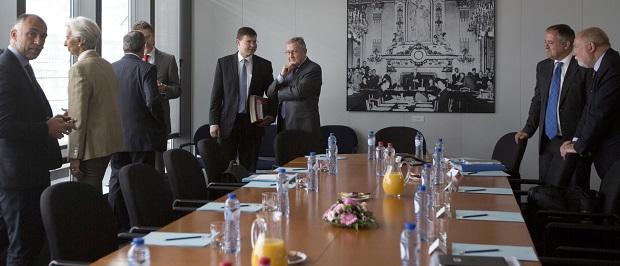Greece bailout deal stalls as talks bog down

Managing Director of the International Monetary Fund Christine Lagarde, second left, looks out of a window as she waits for the start of a meeting on Greece at EU headquarters in Brussels on Wednesday, June 24, 2015. The meeting for a Greek bailout bogged down and a deal was again stalled. AP
BRUSSELS, Belgium — Crucial talks between Greece and its creditors to keep the country solvent and within the euro got bogged down again Wednesday amid differences over what kind of reforms the country should make in exchange for loans.
The impasse forced Eurozone finance ministers to cut short a meeting, which they plan to resume Thursday. Concern over the lack of progress weighed on financial markets, with stock indexes falling in the U.S., where trading was still open.
Earlier in the day, Greek Prime Minister Alexis Tsipras held long talks with key creditors but bickered again over what kind of reforms the country should make in return for much-needed loans.
Greece has promised mainly tax increases to achieve budget savings, whereas the International Monetary Fund would like more spending cuts. Tsipras rejected the creditors’ new suggestions, saying they put both sides further away from a deal.
“The Greek side is unable to agree on such a course,” a Greek government official said after Tsipras assessed the proposals, which included fresh cuts in public sector payrolls and a timetable to scrap a pension safety net fund.
Article continues after this advertisement“These are very tough negotiations,” the Greek official said. “But there is a common will to get somewhere.” The official spoke only on condition of anonymity because the talks were ongoing.
Article continues after this advertisementWednesday’s finance ministers’ meeting was meant to iron out the details on the reforms in time for EU leaders to approve them at a summit they will hold Thursday. Now they will meet again only hours before the summit.
After the finance ministers broke up their meeting, Tsipras again went into meetings with European and IMF top officials.
Greece has a 1.6 billion euro ($1.8 billion) debt to pay on Tuesday which it cannot afford unless the creditors unfreeze 7.2 billion euros (8.1 billion dollars) in bailout money.
A Greek exit from the euro would be hugely painful for the country. Some experts say it could be manageable for Europe and the world economy, but that remains unclear.